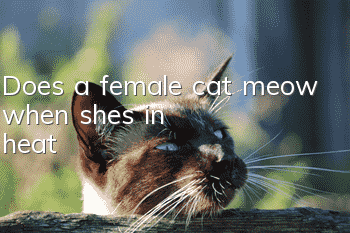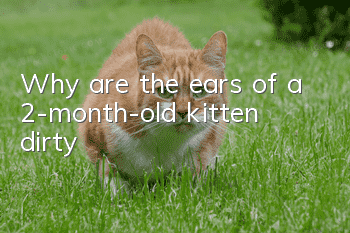Why does a female cat get angry at her own kitten?

The mother cat is angry at her kitten perhaps because the kitten has done something that makes the mother cat angry, so the mother cat will use this method to discipline the kitten. Secondly, if the kitten bites the mother cat painfully while feeding, the mother cat will uncontrollably vent to the kitten when she feels pain. Furthermore, generally speaking, female cats will feel anxious after giving birth. If the anxiety is not relieved, the female cat may breathe on the kittens or even harm the kittens. In addition, in order to train the kittens to live independently, the mother cat will also huff and meow at the kittens.
1. Discipline the kitten
Kittens are naturally more lively and active, and they are very curious about everything. If they do something that makes the mother cat angry, the mother cat will be angry at the kitten unceremoniously. For example, sometimes when a female cat's tail shakes, the kittens will find it very funny, and then they will pounce on the female cat's tail. At this time, some female cats will exhale at the kitten or slap the kitten with their paws. This is to teach the kitten not to behave in the future. Being able to do this again. This is a normal phenomenon, and it is recommended that the owner not interfere too much to prevent the kitten from developing a naughty and disobedient character.
2. Feeling pain
If the mother cat’s milk is not good enough and the kitten cannot suck the milk when sucking, and the mother cat’s nipples are sore while sucking, then the mother cat will vent her anger on the kitten. At this time, it is recommended that the owner feed the female cat more high-protein food, such as boiled chicken breast and canned cat food. The better the female cat eats, the more milk she will produce. In addition, you can also feed kittens special goat milk powder for pets, which can also alleviate the mother cat's milk shortage.
3. Postpartum anxiety
Generally, female cats will feel anxious after giving birth, especially when they see their babies being touched by others. If the anxiety is not relieved, the female cat may breath at the kitten or even attack the kitten. Therefore, it is recommended that owners never touch the kittens after the mother cat has given birth to prevent the kittens from being contaminated with human odor, causing the mother cat to not feed the kittens or even eat the kittens.
4. Training kittens to live independently
Most cats live independently, so female cats believe that kittens should have the ability to live independently around April to May. If the kitten still has to rely on the mother cat at a certain age, the mother cat will yell at the kitten, keep meowing, and even prevent the kitten from getting close to her. This is a cat's talent, and owners don't have to worry too much.
- Why do cats pee randomly? How to correct this habit?
- Why do cats purr?
- How to prevent toxoplasmosis in tabby cats, toxoplasmosis in dogs and cats and their prevention!
- What does it mean when a cat licks another cat?
- What color are Ragdoll cats’ eyes? Can you tell the difference?
- Is it normal for a cat’s ears to be cool?
- Clinical application of antitussive and phlegm-reducing medicine for cats, the cat has a cough!
- Causes of sleeping twitching in American Bobtail cats
- Can Siamese cats still get infected with rhinorrhea after receiving the feline triple vaccine?
- What are the personality traits of cats?



